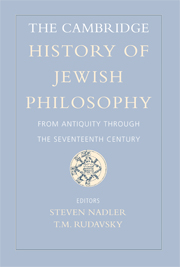Book contents
- Frontmatter
- Introduction
- 1 Texts and Contexts
- II Logic and Language
- III Natural Philosophy
- IV Epistemology and Psychology
- V Metaphysics and Philosophical Theology
- VI Practical Philosophy
- 21 Virtue and Happiness
- 22 Politics and the State
- 23 Divine Law and Human Practices
- Biobibliographical Appendix
- Bibliography
- Index
- References
21 - Virtue and Happiness
from VI - Practical Philosophy
Published online by Cambridge University Press: 28 May 2009
- Frontmatter
- Introduction
- 1 Texts and Contexts
- II Logic and Language
- III Natural Philosophy
- IV Epistemology and Psychology
- V Metaphysics and Philosophical Theology
- VI Practical Philosophy
- 21 Virtue and Happiness
- 22 Politics and the State
- 23 Divine Law and Human Practices
- Biobibliographical Appendix
- Bibliography
- Index
- References
Summary
The number of Jewish philosophical texts devoted exclusively to virtue and happiness is relatively small, yet the themes of virtue and happiness loom large in premodern Jewish philosophy. As key concepts of the science of ethics, virtue and happiness concern not only a theory about character formation and right action but also many assumptions about the structure of the world, the nature of human beings, the purpose of human life, the production and effects of knowledge, the social dimension of philosophy, the ideal political regime, and the relationship between humans and God. Therefore, the discourse on virtue and happiness was inseparable from a host of metaphysical, cosmological, psychological, epistemological, political, and theological theories. The Jewish philosophical discourse, moreover, was not carried out in a vacuum but through interaction with non-Jewish philosophy in the Greco–Roman world and in medieval Islam and Christendom. Through theorizing about virtue and happiness Jewish philosophers articulated their views on being human, being a Jew, and being a Jewish philosopher.
THE GRECO–ROMAN WORLD
Greek Foundations
In the Aristotelian classification of the sciences, practical philosophy studies voluntary actions and involves deliberations about things that are subject to change. Practical philosophy consists of the science of ethics and politics; whereas the former studies the individual, the latter studies society and state, but the two are closely connected: Aristotle’s ethics has social dimensions and his politics are ethical. The science of ethics concerns the cultivation of character through the acquisition of virtues.
- Type
- Chapter
- Information
- The Cambridge History of Jewish PhilosophyFrom Antiquity through the Seventeenth Century, pp. 705 - 767Publisher: Cambridge University PressPrint publication year: 2008



